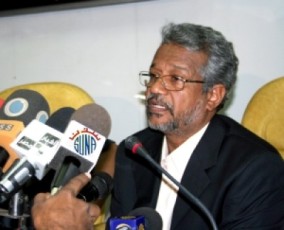Sudan’s government accuses SPLM-N of stalling talks
August 5, 2012 (KHARTOUM) – The Sudanese government’s delegation to the negotiations with the rebel Sudan People’s Liberation Movement North (SPLM-N) has accused the latter of lacking the seriousness to reach an agreement, in the latest recrimination since the fragile talks started last month.

The talks, which started on 23 July under the mediation of the African Union High Level Implementation Panel (AUHIP) to tackle both the humanitarian and political dimensions of the conflict, have so far been marred by mutual mistrust and lack of progress.
According to Obied, the proposals they received from the SPLM-N via the mediation team had contained little details on how to stop the war or provide humanitarian assistance in the two states but rather talked about issues of other regions such as Darfur and the east.
The Sudanese government already rejected SPLM-N attempts to include issues of areas other than South Kordofan and Blue Nile in the negotiations, accusing the rebel group of stalling progress in the talks which were dictated by the United Nations Security Council’s (UNSC) resolution number 2046.
The said resolution ordered the government to cooperate with the SPLM-N in finding a political settlement to the one year conflict in the two states, where the government has also been blocking humanitarian assistance from rebel-controlled areas.
Obied said it is not unlikely that the two sides might reach an agreement on cessation of hostilities but he however insisted that they reject the involvement of SPLM-N in delivering humanitarian assistance saying this must be conducted by a joint mechanism of government and international agencies.
He stressed that the government would not recognize the SPLM-N as a political force unless it severs all ties with the ruling SPLM in neighboring South Sudan, which Khartoum accuses of aiding the rebels who previously fought as part of its army.
The current talks are the first between the government and the SPLM-N since Sudan’s President Omer Al-Bashir withdrew commitment to a framework agreement signed on 28 June last year to recognize the SPLM-N as a political force and demobilize its fighters following the secession of South Sudan.
Obied said that his team did not go to Addis Ababa to “reward holders of arms” in reference to the rebel group. He further sought to allay concerns of hard-line anti-SPLM-N at home over the negotiations, saying that his delegation would engage in talks with clerics and Imams of mosques to come up with a unified position when the new round kicks off after Eid holiday.
His comments follow the eruption of a campaign spearheaded by the far-right Just Peace Forum which mobilized Imams and preachers to reject the talks with the SPLM-N.
(ST)
